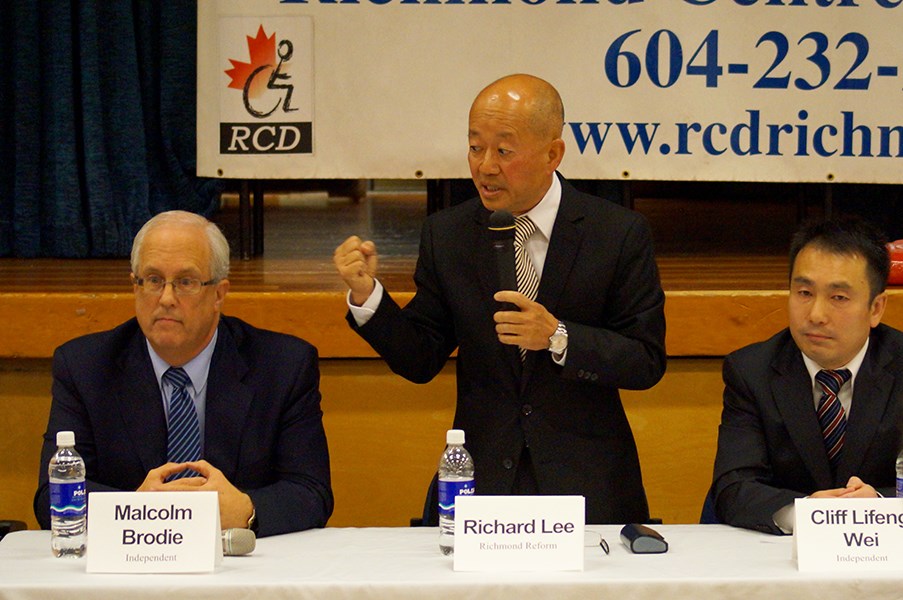ONLINE NOTE: Shaw Cable to air new mayor's debate Wednesday, Oct. 29 at 8 p.m.
Three mayoral candidates squared off on Thursday evening at the Minoru Place Activity Centre. The short debate packed in questions related to foreign language signs, the environment, development, casino revenue and public servant salaries.
Candidates were first asked their views on a potential bylaw to legislate English on public and commercial signs.
Challenger Richard Lee argued that a bylaw is possible under his leadership.
"Do we want a Richmond that is a city that is one community that welcomes all or do we want a city that is a city of many communities divided? The answer is clear, we want one community," said Lee.
"It is not a good thing to have any one language that is other than English on signs," he added.
Lee, a lawyer who has served on council in Merritt, said rights could be limited under law, where appropriate.
"We know there will be people who will say (there is) a right for freedom of expression, but let us understand that any right - like if I'm going to throw my fist at somebody sitting near me - that right stops before that fist hits that person’s head," said Lee, playfully directing his fist toward incumbent Mayor Malcolm Brodie.
"So all rights are conditional and therefore we must have a public process to hear the views of all the people, and if persuasion is not going to do the job then I, as the mayor, am going to lead the way that that's not going to happen," said Lee.
Brodie, the city's mayor since 2001, noted there are few signs in the city that are exclusively non-English. He agreed on consultation but was not open to a bylaw.
"You consult with the community, you talk about cultural harmony and you welcome people, but do not bring in a sign bylaw," said Brodie.
The debate flipped over to a question on climate change and what each person would do to address it.
Challenger Cliff Wei said Beijing has a pollution problem and it shouldn't be repeated in Richmond, thus rapid transit and electric cars are a solution.
Richard Lee said he would do three things to protect the environment.
First, he said he would influence city council to take the fight against the planned jet fuel facility to court, joining the grassroots group VAPOR, which is claiming an airlines consortium didn't properly consult the public.
He said he would make sure no future applications could be made to take the Garden City Lands out of the Agricultural Land Reserve.
The lands, notably, have already been purchased by the city and a legacy plan passed by council this year notes no specific instances whereby any land may be withdrawn from the ALR.
Also, Lee said he would appeal to Victoria "not to go ahead with the industrialization of the Fraser River because that would bring about disaster that would destroy the livelihood of the (river)."
Brodie rebutted, saying Lee's points were on issues that had nothing to do with climate change.
"Our city council has been very proactive…to address climate change"
He noted a long-term flood management program, a district (geothermal) energy program, and the city's low carbon emission goals.
When asked what the city had spent gaming revenue on, to date, Brodie said the city has used the money for community grants, more RCMP and reserves.
While not untrue, grants and policing only account for seven per cent of spending. The Richmond Olympic Oval has accounted for one-third of all gaming expenditures. In fact, the city has spent more on "other" Olympic expenses than on extra policing, to date, since 2004.
Brodie said council has directed city staff to look at future uses, such as more grants, policing, affordable housing and the arts.
Lee suggested using more casino revenues for affordable housing.
Wei said casino money should go lowering property taxes.
The next question asked if concerns of rapid growth and congestion would be addressed in the city.
Lee said developers need to pay their fair share for public works and amenities.
"The problems that come with development and growth that are going to hurt the community…we must fight against that, surely, by making sure that developers have to pay the right amount of development cost charges so we can have the amenities."
Lee said Surrey charges some of the highest development cost charges in the region, but doesn't suffer from a lack of investment.
Brodie redressed city policy of densifying along major roads and in City Centre to preserve farmland and houses. He said the plan is in motion to build around the Canada Line and increase public transit.
The next participant asked about apparently high public servant salaries.
Brodie noted wages are determined by collective agreements and managers are paid relative to their skills and if they aren't paid accordingly they will leave for the private sector.
Lee said public servants are entitled to what they have earned, but in the future the city could utilize the "free market" more in hiring for upper management positions.



